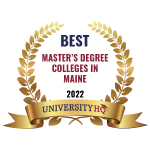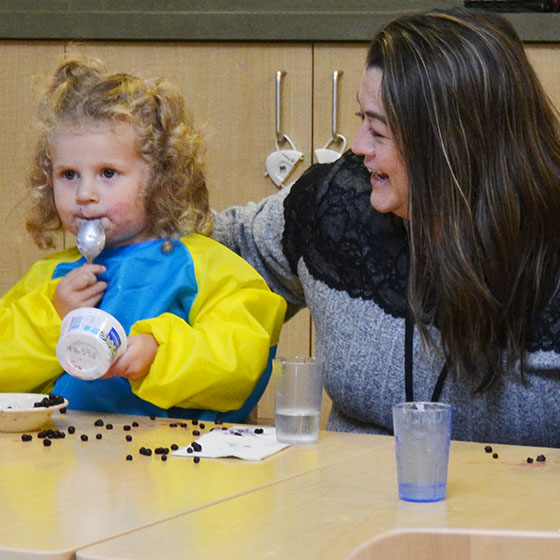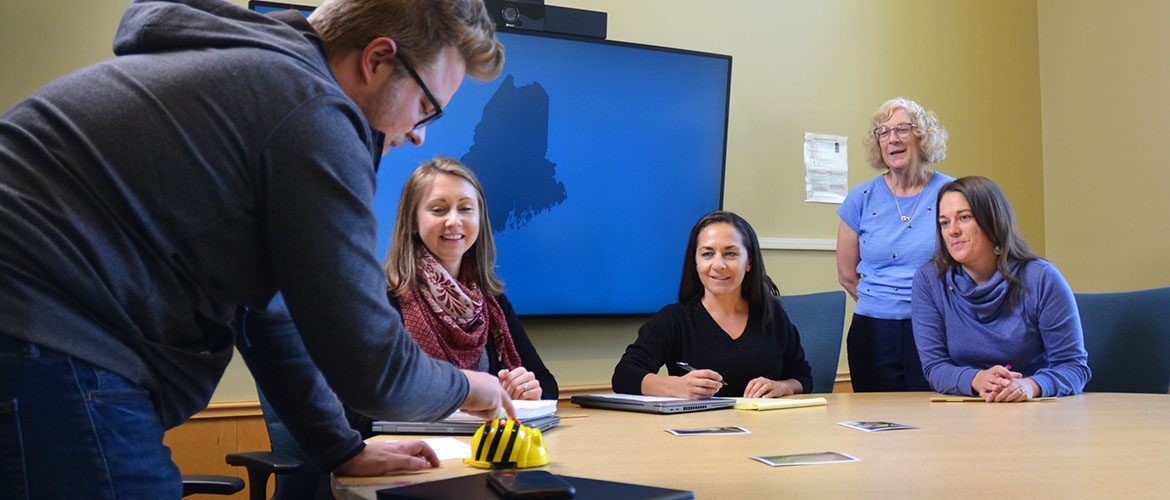As the only Maine-based master’s program in early childhood, the University of Maine at Farmington Master of Science in Education (M.S.Ed.) in Early Childhood is designed for early childhood professionals who wish to become exceptional leaders.
Exceptional leaders in early childhood excel as educators in higher education, trainers, classroom teachers, program administrators, policy advocates, curriculum specialists, program developers, and others who assume early childhood leadership responsibilities.
Through a creative and varied course of study, Early Childhood professionals in the Master’s in Early Childhood Education program develop the skills to collaborate with community agencies and professionals. The program models excellence in education through rigorous coursework and faculty mentoring of research and practice. Exploring issues related to diversity is a common thread found throughout the program.
Program at a Glance
- Convenient blended format: 70% online / 30% face-to-face
- 36 graduate credit hours completed within 6 years of matriculation
- 24 core credit hours and 12 elective credits
There’s an enormous capacity for change that exists only at the early childhood level. Early childhood educators work in a field where what they do can make a meaningful difference in the lives of their students.
With demand for early childhood educators throughout the state, having your master’s means you’ll be able to choose where and how you want to work. It’s time to invest in yourself…and your future.
 UMF is rated by University Headquarters as having some of the Best Master’s Degrees in Maine (#2 overall). University Headquarters is an industry-leading, independent educational organization that compiles a comprehensive set of information for students who wish to pursue a higher education.
UMF is rated by University Headquarters as having some of the Best Master’s Degrees in Maine (#2 overall). University Headquarters is an industry-leading, independent educational organization that compiles a comprehensive set of information for students who wish to pursue a higher education.
Apply Now Request More Information
In-Person and Online: The Best of Both Worlds
The master’s program is taught in-person and online, with roughly 30% of the program taught in-person and 70% online. Typically, the 30% face-to-face instruction takes place over the course of 3 Saturday classes.
Our graduates have consistently told us that this format allows them to experience the best of both worlds: the convenience of online education with the ability to make connections and expand your professional network through face-to-face interaction.

“I knew I wanted a leadership position here at Educare and getting my Master’s degree in Early Childhood Education would set me up for that. The Master’s program at UMF gave me everything I needed – advanced knowledge about child development, best practices in family engagement, how to be a professional and how to really advocate policy.”
– Erica Palmer, Education Manager at Educare of Central Maine
Master’s in Early Childhood Education Curriculum
The M.S.Ed. in Early Childhood curriculum is carefully designed to contribute to the intellectual and professional growth of those who work with children ages birth through age 8. The program emphasizes child development-based curriculum, development, and assessment across ages birth through age 8, as well as an understanding of the family and community contexts in which these children are educated.
This emphasis helps Early Childhood professionals address the needs of children and families in today’s changing, diverse world.
Core Curriculum (24 credits)
- ECH 500 Early Childhood Education in Today’s World
- ECH 533 Advanced Foundations of Child Development
- ECH 534 Advanced Program Administration and Leadership
- ECH 535 Play and the Social World of the Child
- ECH 538 Collaboration with Families and Communities
- ECH 539 Curriculum Development and Assessment
- ECH 540 Research Methods in Early Childhood
- ECH 541 Field-Based Research
Electives (12 credits)
- ECH 502 Diverse Programming in Early Learning Environments
- ECH 504 Early Childhood Policy and Research
- ECH 505 Mathematics in the Early Childhood Years
- ECH 506 Language and Literacy in the Early Years
- ECH 507 Advanced Infant and Toddler Development and Curriculum
- ECH 537 Science in the Early Childhood Years
- ECH 577 Special Topics in Early Childhood Education
To see course descriptions please review the Graduate Catalog.
Application Process & Due Dates
All applicants are strongly encouraged to contact the Division of Graduate & Continuing Education office prior to application to discuss the program and professional goals. Call us at 207-778-7502 or email us at gradstudies@maine.edu.
Applications are accepted on a rolling basis, and will be considered when complete. Students may enroll in some courses as a non-matriculated student prior to acceptance into the program.
Due Dates
- Spring Term: December 9
- Summer Term: April 24
- Fall Term: August 14
How to Apply
To apply for the M.S.Ed. in Early Childhood, you will need to provide the following:
In order to apply, you must have a baccalaureate degree in Early Childhood Education or a closely related field from a regionally accredited college or university OR a baccalaureate degree in a non-related field OR in an education field outside of the early childhood years.
- If you have a non-Early Childhood Education degree, you must provide a clear rationale for relevant preparation to enter the Early Childhood program at an advanced level of study. See Supplementary Essay below for details.
- If you have a foreign degree, it must be validated by World Educational Services, Center for Educational Documentation, Inc., or another appropriate agency. The decision to accept the degree is made on a case-by-case basis by the Associate Dean for Graduate and Continuing Education.
You must also have access to active programs for children and families in order to complete field experiences, including research projects.
Please email completed forms to: gradstudies@maine.edu
Please provide official transcripts from each institution you have attended (including both the undergraduate and graduate level). Official transcripts must be sent directly from the institutions to the UMF’s Office of Graduate Studies. If you attended a UMaine System school (UMA, UMF, UMFK, UMM, UM, UMPI, or USM), the Office of Graduate Studies can obtain your transcript for you.
Applicants must submit an essay that will be reviewed by the Graduate Admission Committee to evaluate your ability to organize your thoughts and write clearly, correctly, and creatively at a level required for graduate study. We consider your essay an important piece of information to help us make a decision.
Your essay will be evaluated for content and professional writing style, grammar, spelling, and vocabulary. 500 word limit. Please address all of these topics:
- Self Assessment: Analyze the strengths, including career and leadership experience, that will contribute to your success in UMF’s master’s program. Articulate the knowledge and skills you wish to develop further.
- Vision and Values: Describe your vision of high quality early childhood education in today’s world and the values that guide your work with young children and the families.
If you did not complete an undergraduate degree in early childhood or a closely related field (i.e. child development, early childhood special education, human development), you must submit an additional essay in response to the following prompts. 500 word limit.
Please address all topics.
- Describe a clear rationale for relevant preparation to enter an early childhood program at an advanced level of study (such as foundational knowledge and/or knowledge of current issues in the field)
- Summarize your work experience with children and families in birth to age eight programs.
Two recommendation forms are required:
- One from current administrator, program director, or program owner. If you are a director or owner, include a recommendation form from an early childhood professional colleague
- One from a professional colleague
Download Recommendation Form>>
Note: This is a fillable form, and you may need to download it to enable it.
Most courses require some direct contact with children, through observations, projects, and/or research. You will need to have a clear criminal history and child abuse and neglect check and provide current documentation to the Office of Graduate Studies. Any fee incurred will be your responsibility.
Documentation may be:
Option 1: Two documents
- Maine Department of Health and Human Services clear check of substantiated Maine Child Protective Services Cases (This check must be initiated by the agency where you are employed.) AND
- Maine State Bureau Identification Maine Criminal History Check (This check can be obtained on your own.)
Option 2:
- Copy of current Maine DOE public teaching certification that indicates a Criminal History Check has been conducted.
Option 3:
- Copy of Initial Educational Approval from Maine DOE that indicates a Criminal History Check has been conducted
If you are requesting that graduate-level coursework be transferred from another institution into this UMF Master’s program, in addition to your transcript you must submit the syllabi for each course you would like considered for transfer. Transfer decisions are made at the time of admission.
A student, with the approval of the Admissions Committee, may transfer up to 9 graduate credits from another institution into his/her academic program; only 3 of these credits may be in the core of the program.
These credits must have been earned from a regionally accredited institution, within 5 years prior to admission, and with a minimum grade of B (or equivalent). Graduate credits applied toward an undergraduate degree cannot be used toward the Master’s degree.
University of Maine at Farmington. Make the Most of Your Education.
Getting a master’s is a big deal, so make the most of your education with a quality program at nationally recognized University of Maine at Farmington. Well-known for excellence in teacher education, UMF offers a number of graduate programs for teaching professionals, including 5 on-campus Master’s degree programs, 10 different Graduate Certificate programs, a 100% online Master’s program, a Special Education Alternative Route to Certification, and more. We also offer a new Master’s in Counseling Psychology with a Creative Arts Focus that provides a solid clinical foundation while integrating the creative arts into the practice of counseling and psychotherapy.
The Division of Graduate & Continuing Education is at the center of UMF’s commitment to collaboration with teachers working in Maine’s Pre K-12 schools. This commitment finds life in programs that have a long history of quality, as well as new programs that are developed each year in response to needs voiced by the Pre K-12 community.
The University of Maine at Farmington is accredited by the New England Commission of Higher Education (NECHE).


